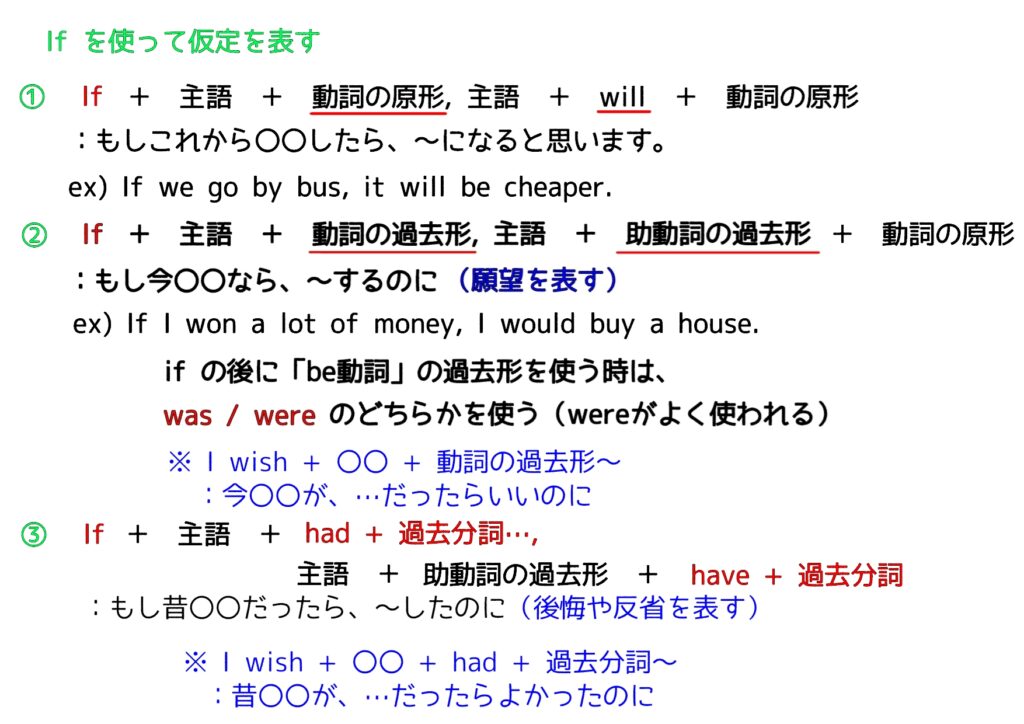第85回:「もし、自分があなたの立場なら…」を英語で。

自分が思っていることを伝える表現を知っておくことは大切です。この表現は、アドバイスにも使えますね!
Q. この記事で、一番大事なことって何?
A. 大事なことを、1枚の画像にまとめました。

いちいちノートにまとめるのが面倒だという方、また、
ノートにまとめることが苦手だという方は、ご活用ください。
※今回の表現は、以下の内容を活用した応用編です。

[広告]
確かな英語力は、日々の継続から。
その継続を後押しする、第二言語習得理論に基づいた
オンライン英語学習プログラムがあります。
英語を使う人のための、確実なスキルアップが望める
7日間の無料体験はこちらから!

仮定法を活用した表現の幅を広げる。
- 非現実的な条件文では、if節の主語にはwereを使用することができます。これには一人称や三人称の単数の主語(例:I/she/he/it)も含まれます。このwereの使用は、時折過去の仮定法と呼ばれ、一般的には形式的な文脈で好まれます。動詞の過去形が表していることは想像上の現在または未来です。
- 例: If your mother were here, I’m sure she wouldn’t let you eat all those chocolates.
- 例: My job would not exist if it were not for government funding.
- この意味ではwereの代わりにwasを使用することもできます(「If your mother was here…」など)。ただし、「If I were you…」のようなアドバイスをする場合には、wereをwasの代わりに使用することが好まれます。
- 以下のようにwereは他のパターンでも使用されます。
- (i) were + 主語 + to不定詞やwere + 主語 が、if + 主語 + was / were のより形式的な代替として使用される場合:
例: Were the election to be held today, the Liberals would win easily. (or If the election was/ were held today…)
例: Were I not in my seventies and rather unfit, I might consider taking up squash. (or If I wasn’t / weren’t in my seventies and rather unfit…) - (ii) wishの後に:
例: I enjoy my job enormously, but I wish it were closer to home. (or … I wish it was…)
例: Of course I’m pleased that Jan has been given the award. I only wish he weren’t so boastful about it (or… I only wish he wasn’t…) - (iii) if onlyの後に:
例: ‘If your job is so bad, why don’t you leave?’ ‘If only it were that simple.’ (or If only it was…)
例: I’d really like to do accounting. If only I weren’t so poor at maths. (or If only I wasn’t…) - (iv) 自分の好みについて表現する would (‘d) ratherとwould (‘d) soonerの後に:
例: I feel embarrassed about what happened and would rather the event were forgotten. (or … was forgotten.)
例: ‘I’ve arranged a meeting for the end of July.” “I’d sooner it were earlier, if possible. (or … it was earlier.) - (v) suppose、supposing、imagineで始まる文や節の後に:
例: Suppose I were to lower the price by £100. Would you consider buying the car then? (or Suppose I was to lower …)
例: I know it looks rather dirty now, but imagine the house were (to be) repainted. It would look a lot more attractive. (or imagine the house was (to be) repainted.) - (vi) as ifやas thoughの後に、およびeven ifの後に:
例: I remember stepping off the boat in New York as if it were yesterday.
例: Despite losing the election, she continues to act as though she were prime minister.
例: It’s too late to start the work this year even if it were possible to find the money for it.
以上のように、条件文や比較文ではwereが使用されることがあります。文脈や表現の意図に応じて、適切な形式を使い分けることが重要です。
具体例
- Unreal Conditional Sentences:
- If I were you, I would quit my job and travel the world.
- Imagine if he were to win the lottery and become a millionaire overnight.
- Other Patterns with “Were”:
- Were the weather to improve, we could go for a picnic.
- I wish it were sunny today so that we could go to the beach.
- If only I weren’t so afraid of heights, I would go skydiving.
- Preferences:
- I’d rather it were Friday already. I’m exhausted from work.
- I’d sooner she were my partner for the dance competition. She’s an amazing dancer.
- Suppose, Supposing, Imagine:
- Suppose I were to become the president. What changes would I make?
- Imagine if I were taller. I could reach the top shelf without any trouble.
- Comparisons:
- She acts as if she were the CEO of the company, even though she’s just an intern.
- It feels as though it were summer already, with the warm breeze and blooming flowers.
- Even if it were the last piece of cake, I would still share it with you.
Please note that the examples provided here are fictional and created for illustrative purposes.
[広告]
TOEICのスコアを上げたいけれど、
まとまった勉強時間が取れなくて困っている…
なら、細かいスキマの時間を使いながら、
少しずつスキルを積み重ねてみてはどうでしょう。
スマホ1つでスコアアップが出来る、
オンライン講座のリンクはこちらから。

Q. この文法はどうやって使うのでしょうか?
A. 今回の文法を活用した会話文を見てみましょう。

If I were you, I wouldn’t eat that entire cake. It’s too much.
(もし私が君だったら、そのケーキを全部食べないね。量が多すぎるよ。)

Oh, come on! I can handle it.
(大丈夫だって。食べれるよ。)

Seriously, if I were you, I’d save some for later. You’ll regret it.
(正直な話、もし私が君だったら、後で食べるために取っておくよ。今食べると後悔するよ。)

Well, if it were your birthday, you wouldn’t stop at just one slice either!
(まあ、今日が君の誕生日だったら、一切れだけで我慢しないよね!そういうこと。)
[広告]
ロゼッタストーン・ラーニングセンターで、最先端の教育制度を活用して英語を学びませんか?私たちは個々の学習ペースに合わせてeラーニングと対面教育を組み合わせ、柔軟な学習環境を提供しています。自宅でのeラーニングと対面教育のメリットを最大限に活かし、あなたの英語学習をサポートします。最新のテクノロジーと個別の指導が組み合わさった当センターで、自由な学習スタイルを体験してみませんか?英語学習を楽しく効果的に進めるための環境がここにあります。新たな一歩を踏み出して、新しい英語学習の旅に参加しましょう!

Q. この記事の要点は?
A. 「were」を活用する表現を確認しました。
- Unreal conditional sentences:
- “Were” can be used after any subject in the if-clause, including singular first and third person subjects.
- This use of “were” is called the past subjunctive and is preferred in formal contexts.
- “Was” can also be used with the same meaning, but “were” is preferred when giving advice with “If I were you…”
- Other patterns using “were” in imaginary situations:
- “Were” + subject + to-infinitive or “were” + subject is used as a more formal alternative to “if” + subject + was/were.
- “Were” is used after “wish” to express a desire for a different situation.
- “Were” is used after “if only” to express regret about a situation.
- “Were” is used after “would (/’d) rather” and “would (/’d) sooner” to express preferences.
- “Were” is used after “suppose,” “supposing,” and “imagine” to talk about hypothetical scenarios.
- “Were” is used after “as if” and “as though” in comparisons.
- “Were” is used after “even if” to indicate a hypothetical condition.
Note: In some cases, “was” can be used instead of “were,” but “were” is generally preferred in formal contexts and specific expressions.
英会話を始めてみたいけれど、どのサービスが良いか分からない…
そんな方は、まず、この記事で3つのサービスを比べてみてはいかがでしょうか?
英語力を効率良く伸ばすことができるサービス3選です。

次回の文法解説は?
「もし…ではないなら〜」を「if」を使わずに表す。
この記事を作る際に参考にした文法の解説書になります。
すべて英語で書かれていますが、練習問題が付いてます。
イギリス英語なので、スペル等の表記が異なる部分もありますが、
「使い方を練習したい」「繰り返し問題を解きたい」
という方は、使ってみても良いかもしれません。

関連記事一覧
他の文法解説記事を検索できます。




-320x180.jpg)








コメント